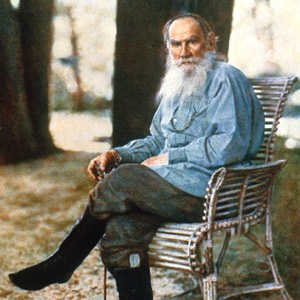
Leo Tolstoy (1828 – 1910), also known as Count Lev Nikolayevich Tolstoy, was a Russian writer who is regarded as one of the greatest authors of all time. He is best known for his novels, including War and Peace and Resurrection, but he also wrote plays and numerous philosophical essays. His fiction consistently attempted to convey realistically the Russian society in which he lived. In the 1870’s Tolstoy experienced a profound moral crisis, followed by what he regarded as an equally profound spiritual awakening, as outlined in his nonfiction work A Confession.

Quotes by Leo Tolstoy…
I knew not the light, and I thought there was no sure truth in life; but when I perceived that only light enables men to live, I sought to find the sources of the light… And when I reached this source of light I was dazzled with the splendour, and I found there full answers to my questions as to the purpose of the lives of myself and others.
As a man in his sleep doubts the reality of his nightmares and yearns to awaken and return to real life, so the average man of our day cannot, in the depths of his heart, believe the terrible condition in which he finds himself — and which is growing worse and worse — to be a reality. He yearns to attain to a higher reality, the consciousness of which is already within him… Our average man has but to make a conscious effort and ask himself, “Is not all this an illusion?” in order to feel like an awakened sleeper, transported from a hypocritical and horrible nightmare-world into a living, peaceful, and joyous world of reality.
This power demands of us what alone is certain and rational and possible… which is possible only in the truth, and, therefore, in the recognition of the truth revealed to us, and the profession of that truth.
All the ills of mankind appear, according to Lao Tzu, not from man’s neglect of the necessary, but because he does what is unnecessary. If men would practice what Lao Tzu calls non-action, they would be free not only of their personal difficulties, but also of those residing in every form of government.
The principles of this authentic religion are entirely natural to man, so that the instant they are communicated to him they are received as ideas long familiar and self-evident… These principles are quite simple, understandable, and few in number.
Man’s life begins only with the appearance of rational consciousness.
A horse which is harnessed to a wagon along with other horses is not free… The same situation is true of man.
But maybe I have overlooked something, or misunderstood certain ideas. It cannot be possible that this condition of despair is natural to man.
Whoever you are, who read these lines, think about your position and your duties, not upon your position as landowner, merchant, judge, emperor, president, clergyman, priest, or soldier, which temporarily call you, nor of the imaginary duties which these positions impose upon you, but think about your real and eternal condition as a human being.
In fearing to make an effort to escape from conditions that are fatal to us, because the future is obscure and unknown, we are like passengers on a sinking ship, who crowd into the cabin and refuse to leave it, because they have not the courage to enter the boat that would carry them to shore.
